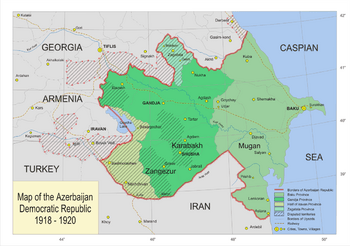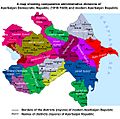Azerbaijan Democratic Republic facts for kids
Quick facts for kids
Azerbaijan Democratic Republic
Azərbaycan Demokratik Respublikası
|
|||||||||
|---|---|---|---|---|---|---|---|---|---|
| 1918–1920 | |||||||||
|
|
|||||||||
|
Motto: Bir kərə yüksələn bayraq bir daha enməz!
The flag once raised will never fall! |
|||||||||
|
Anthem: Azərbaycan Marşı
March of Azerbaijan |
|||||||||

Map of Azerbaijan including disputed territories with Armenia and Georgia issued in Baku for Paris Peace Conference in 1919.
|
|||||||||
| Capital | Ganja (until Sep 1918) Baku |
||||||||
| Common languages | Azerbaijani | ||||||||
| Government | Parliamentary republic | ||||||||
| Prime Minister | |||||||||
|
• 1918–1919
|
Fatali Khan Khoyski | ||||||||
|
• 1919–1920
|
Nasib Yusifbeyli | ||||||||
|
• 1920
|
Mammad Hasan Hajinski | ||||||||
| Speaker | |||||||||
|
• 1918
|
Mammed Amin Rasulzade | ||||||||
|
• 1918–1920
|
Alimardan Topchubashev | ||||||||
| Historical era | Interwar period | ||||||||
|
• Independence
|
28 May 1918 | ||||||||
|
• Soviet invasion
|
28 April 1920 | ||||||||
| Area | |||||||||
| 1918 | 99,908.87 km2 (38,575.03 sq mi) | ||||||||
| Population | |||||||||
|
• 1918
|
2862000 | ||||||||
| Currency | Azerbaijani manat | ||||||||
| ISO 3166 code | AZ | ||||||||
|
|||||||||
| Today part of | |||||||||
The Azerbaijan Democratic Republic (ADR) was a country that existed for a short time. It was the first time a democratic and non-religious republic was successfully created in the Muslim world. This happened even before the Republic of Turkey was formed.
The ADR was started on May 28, 1918. This was after the Russian Empire fell apart following the Russian Revolution of 1917. The Azerbaijani National Council formed the ADR in Tiflis, Georgia.
The country shared borders with Russia to the north and Democratic Republic of Georgia to the northwest. To the west was the Democratic Republic of Armenia, and to the south was the Persian Empire (modern-day Iran). About 2.86 million people lived there.
Ganja was the first capital city. This was because Baku, the planned capital, was controlled by the Bolsheviks at that time.
Contents
How the Government Worked
The ADR had a parliamentary system of government. This means the country was run by a parliament called the Milli Majlis, or National Assembly.
Who Could Vote?
People elected members to the parliament. Everyone could vote, and votes were counted fairly. This made the parliament the most important part of the government. The Council of Ministers, like a cabinet, had to answer to the parliament.
First Leaders
Fatali Khan Khoyski became the first prime minister. The main political party was Musavat, which had the most seats. Other parties included Ehrar, Ittihad, and Muslim Social-democrats.
People from different groups also had seats in parliament. These included Armenians (21 out of 120 seats), Russians, Poles, Jews, and Germans.
Important Changes and Achievements
The parliament made many important changes. One of the biggest was giving women the right to vote. This made Azerbaijan the first Muslim nation to give women the same political rights as men.
This change happened even earlier than in countries like the United Kingdom and the United States. Another great achievement was starting Baku State University. This was the first modern university in Azerbaijan.
End of the Azerbaijan Democratic Republic
By March 1920, it became clear that Soviet Russia was going to attack Azerbaijan. The Soviet leader, Vladimir Lenin, said this was necessary. He believed Soviet Russia needed the oil fields in Baku to survive. At that time, Baku had the largest oil fields in the world.
People in Moscow thought they should "help" the workers in Baku. They wanted to overthrow the "nationalists," which meant the government of the Azerbaijan Democratic Republic.
The Invasion of 1920
After a big political problem, the government of the Azerbaijan Democratic Republic resigned on April 1, 1920. On April 25, 1920, the Soviet Russian 11th Red Army entered Azerbaijan. They reached Baku on April 27.
The Red Army demanded that the Azerbaijani parliament close down. They wanted to set up their own Bolshevik government, led by Nariman Narimanov. To avoid fighting and bloodshed, the parliament members agreed.
The ADR officially ended on April 28, 1920. It was replaced by the Azerbaijan Soviet Socialist Republic (Azerbaijan SSR). The Azerbaijani army offered little resistance in Baku. This was because most of their soldiers were busy fighting on the Karabakh front.
After the Invasion
In May 1920, there was a big rebellion in Ganja. People wanted to bring back the Musavatists to power. But the Soviet Russian 11th Red Army crushed this rebellion by May 31.
Many leaders of the ADR had to leave the country. Some went to the Democratic Republic of Georgia, then to Turkey and Iran. Others were captured by the Bolsheviks. For example, Mammed Amin Rasulzade was captured but later allowed to leave the country.
Some leaders, like General Selimov and General Sulkevich, were killed. In total, over 20 generals lost their lives. Some students and citizens who were abroad never returned home.
However, some important military leaders, like General Samedbey Mehmandarov and General Ali-Agha Shikhlinski, were arrested but later released. They spent their last years teaching at a military school in the Azerbaijan SSR.
Even though the Azerbaijan Democratic Republic was short-lived, many people fought against the Russian takeover. About 20,000 people died resisting. However, some workers in Baku supported the Bolshevik ideas, which made it easier for the Azerbaijan Soviet Socialist Republic to be formed.
Related pages
Images for kids
-
A founder and Speaker of the Republic, Mammad Amin Rasulzade is widely regarded as the national leader of Azerbaijan.
-
Major General Khosrov bey Sultanov, Minister of Defense of the Azerbaijani Democratic Republic.
-
Ali-Agha Shikhlinski was a Lieutenant-General of the Imperial Russian Army and the Deputy Minister of Defense and General of the Artillery of the Azerbaijan Democratic Republic.
-
Samad bey Mehmandarov was a General of the Artillery in Imperial Russian Army before becoming the Azerbaijan Democratic Republic's Minister of Defense.
-
Remains of the editorial offices of the Kaspi newspaper on Baku's Nikolayevskaya Street (modern-day Istiqlaliyyet Street), ruined during the March Days in 1918
See also
 In Spanish: República Democrática de Azerbaiyán para niños
In Spanish: República Democrática de Azerbaiyán para niños
 | George Robert Carruthers |
 | Patricia Bath |
 | Jan Ernst Matzeliger |
 | Alexander Miles |














